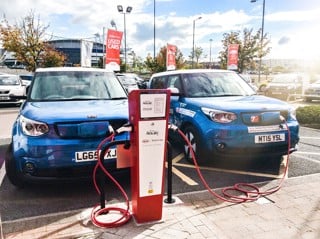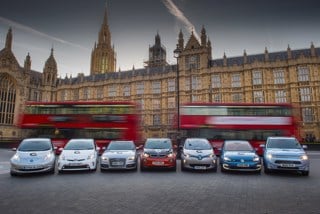Robust action by Government and informed decisions on fleet vehicle mix and driving behaviours are vital in order for the UK to achieve is emissions obligations, according to a report by the Committee on Climate Change (CCC).
Its 2019 Progress Report to Parliament report states that UK action to curb greenhouse gas emissions is lagging far behind what is required ‘even to meet previous, less stringent, emissions targets’. It highlights that the required annual rate of emissions reduction for Net Zero is 50% higher than under the UK’s previous 2050 target and 30% higher than has been achieved on average since 1990.
Lord Deben, CCC Chairman, said: “The UK is the first major economy to set a net-zero emissions target and intends to host the world’s leaders at next year’s landmark climate conference (COP26). These are historic steps forward and position the UK at the forefront of the global low-carbon transition. But international ambition does not deliver domestic action. It’s time for the Government to show it takes its responsibilities seriously. Reducing emissions to net zero by 2050, requires real action by Government now.”
Fleet decision makers welcomed the Government’s long awaited clarification on benefit-in-kind (BIK) tax for 2020/21. The announcement that company car drivers choosing a pure electric vehicle will pay no BIK tax in 2020/21 came in its much anticipated response to the review of WLTP and vehicle taxes.
The Government says that “by providing clarity of future the appropriate percentages, businesses will have the ability to make more informed decisions about how they make the transition to zero emission fleets”.
Although percentages beyond 2022-23 remain under review, the Government “aims to announce appropriate percentages at least two years ahead of implementation to provide certainty for employers, employees and fleet operators”.
Reacting to the Government announcement around future BIK rates, Matthew Walters, head of consultancy and customer data services at LeasePlan UK, said: “This is a milestone moment for the industry, as it is the first time company cars will pay no tax at all, following the announcement that zero emission vehicles, along with hybrids that have an all electric range of 130 miles, will have their taxes scrapped.
“We also welcome the clarity that this announcement has brought to the tax years of 2021/22 and 2022/33, as well as the notable reduced rate at which the increase will occur, by 1% per annum.
“Whilst the Government is taking action, we are expecting higher CO2 figures on traditional fuels as we move to WLTP – it’s therefore essential that businesses work with their fleet providers to understand not just the costs involved, but the future fleet make-up and strategy – which will undoubtedly mean exploring the potential for low emission vehicles.”
In order to meet the UK’s legally-binding emissions targets, the CCC’s 2019 Progress Report to Parliament recommends that Government policies to reduce UK emissions to net zero are business-friendly. Policy should provide clear and stable direction and a simple, investable set of rules and incentives which leave room for businesses to innovate and find the most effective means of switching to low-carbon technologies.
In order to support the accelerated adoption of EVs viable infrastructure and sufficient power to meet the increased demands will be critical.
Energy Networks Association’s Chief Executive, David Smith said: “It has been a historic year for the UK after outlining a highly ambitious vision for net zero emissions by 2050 and we must now seize this momentum to deliver the action needed.
“Our energy network companies will be at the heart of this action, building on the work already led by electricity network companies to integrate record levels of low-carbon electricity generation into the system while keeping costs low for the public. Not only have these network companies helped drive the low-carbon transition, but they are working closely with government and the wider industry to ensure the networks remain resilient in the face of climate change.
“Similarly, as we start to tackle some of our greatest challenges including the decarbonisation of industry, heat and transport, ENA’s industry-wide Gas Decarbonisation Pathways Project is outlining a clear vision and actions for the low-cost, low carbon gas networks of the future.”





















Login to comment
Comments
No comments have been made yet.